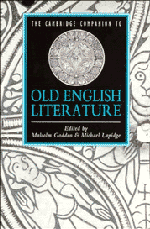Book contents
- Frontmatter
- 1 Anglo-Saxon society and its literature
- 2 The Old English language
- 3 The nature of Old English verse
- 4 The nature of Old English prose
- 5 Germanic legend in Old English literature
- 6 Heroic values and Christian ethics
- 7 Pagan survivals and popular belief
- 8 Beowulf
- 9 Fatalism and the millennium
- 10 Perceptions of transience
- 11 Perceptions of eternity
- 12 Biblical literature
- 13 Biblical literature
- 14 The saintly life in Anglo-Saxon England
- 15 The world of Anglo-Saxon learning
- Further reading
- Index
- Series List
12 - Biblical literature
the Old Testament
Published online by Cambridge University Press: 28 May 2006
- Frontmatter
- 1 Anglo-Saxon society and its literature
- 2 The Old English language
- 3 The nature of Old English verse
- 4 The nature of Old English prose
- 5 Germanic legend in Old English literature
- 6 Heroic values and Christian ethics
- 7 Pagan survivals and popular belief
- 8 Beowulf
- 9 Fatalism and the millennium
- 10 Perceptions of transience
- 11 Perceptions of eternity
- 12 Biblical literature
- 13 Biblical literature
- 14 The saintly life in Anglo-Saxon England
- 15 The world of Anglo-Saxon learning
- Further reading
- Index
- Series List
Summary
The Old Testament captured the Anglo-Saxon imagination in some unexpected ways, as one of the poetic riddles in the Exeter Book testifies:
Wer sæt æt wine mid his wifum twam ond his twegen suno ond his twa dohtor, swase gesweostor, ond hyra suno twegen, freolico frumbearn; fæder wæs ϸær inne ϸara æϸelinga æghwæðres mid, earn ond nefa. Ealra wæron fife eorla ond idesa insittendra. (Riddle 46)
A man sat at wine with his two wives and his two sons and his two daughters, beloved sisters, and their two sons, noble first-born; the father was in there of both of those princes, the uncle and the nephew. In all there were five lords and ladies sitting in there.
The conundrum by which twelve people turn out to be only five finds its explanation in the book of Genesis, where it is recorded that Lot's two daughters lay with him and each had a son by him. Yet if this poet found such episodes a gleefully unembarrassing source of wit, other Anglo-Saxon writers clearly found them a troubling challenge, finding it necessary to argue against taking the morals of the patriarchs as any sort of precedent for present practice.
- Type
- Chapter
- Information
- The Cambridge Companion to Old English Literature , pp. 206 - 226Publisher: Cambridge University PressPrint publication year: 1991
- 8
- Cited by

